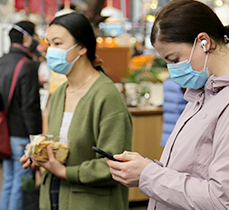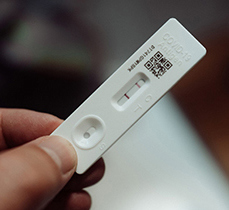Our main objectives are to:
- actively seek to address gaps in knowledge and to collate and provide novel strategic information on COVID-19 in order to inform the Australian and international response
- work closely with international partners and communities in our region to strengthen their COVID-19 response, achieve vaccine equity and minimise impacts on the health system.
Our COVID-19 research is focused on:
- vaccines. For example, Burnet researchers are currently working on developing a second-generation COVID-19 vaccine that aims to be effective against all variants.
- antivirals. Our scientists are working to develop COVID-19 antivirals, biological medicines that can prevent and treat the infection caused by the virus.
- diagnostics. Our team worked in collaboration with Doherty Institute researchers to develop a new finger prick test that can measure the level of neutralising antibodies to COVID-19. This test can be used to analyse a person’s current level of immunity to the virus and help determine whether they might need a booster shot.
- public health. Burnet researchers have been working to provide timely and high-quality data to assist governments in making informed, precise and impactful policies during the COVID-19 response
- modelling. Burnet’s COVASIM model has helped inform public health policy by the Victorian, NSW and Australian governments in the challenging first two years of the COVID-19 pandemic.
For example, the model was used to assess the impact of easing COVID-19 restrictions in Victoria which included an analysis of different intervention options and combinations, e.g. testing, contact tracing and quarantine of close contacts and their household contacts, isolation of confirmed cases, physical distancing policies in venues, COVID-19 protection measures such as mask wearing and vaccination programs.
Burnet’s innovative and evidence-based public health and laboratory-led research initiatives continue to contribute solutions in response to COVID-19. Burnet scientists have stepped up to meet the needs of government and community to help frame the response. This has included our participation in the national conversation on the best way to live with and manage the virus and its variants.
times more powerful, potentially, than existing options, Burnet’s next-generation enhanced medicines for the prevention and treatment of COVID-19 are currently in development.
minutes is how long it takes for the finger prick test developed by Burnet and Doherty Institute researchers to determine the level of neutralising antibodies to COVID-19.
Victorians participated in the Optimise Study, a partnership between Burnet and the Doherty Institute. Through surveys, diaries and other qualitative research conducted by Optimise, the team was able to look at what was happening with COVID-19, how it was impacting Victorians, and rapidly reporting this back to government and the broader community.
Australians are likely to have or have had Long COVID, according to estimates by our researchers, which were included in our submission to the House of Representatives Health Committee Inquiry into Long COVID and Repeated COVID Infections.
Working Groups
Burnet is an Australian-based medical research and public health institute and international non-government organisation that is working towards a more equitable world through better health.






